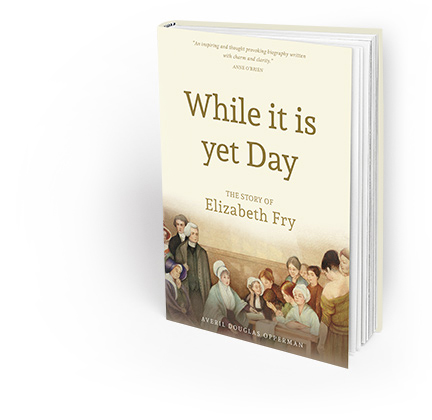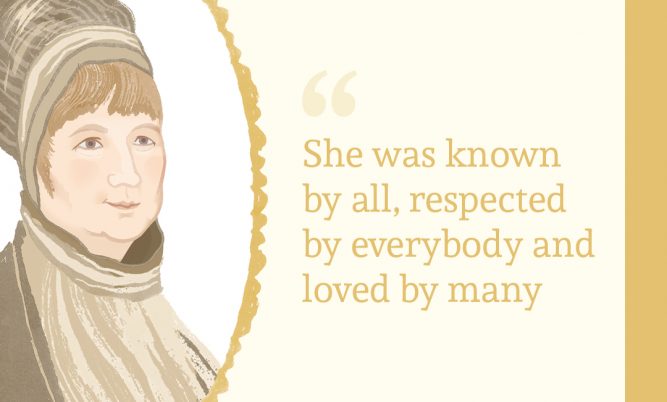Have you ever been in prison? Me neither. Aren’t we lucky?
DNA or Nurture? No one knows for certain. We all make mistakes – the difference being the gravity of our errors. How many young children at school, when asked what they want to do when they grow up, reply ‘Do bad things and go to prison’?
Last night’s episode of Panorama, Prisons Unlocked, was shocking. It opened the cell doors, onto drug abuse (mostly SPICE, a cheap chemical and dangerous alternative to cannabis), bullying, violence and frightened staff. Basically, the inmates are in control. It was just as bad as I had expected. Though one jail does not a prison system make. HM Prison Northumberland is privately run by a French company, Sodexo, that will have to stand up and face the fact that it has failed miserably.
What struck me forcibly were the parallels with prison in Elizabeth Fry’s 19th century London. When researching my biography of this remarkable woman, While It Is Yet Day, I was shocked by the pandemonium, violence, over-crowding, lack of respect and drug-taking that her fascinating letters and diaries describe. In her day, the ‘drug’ was alcohol – namely beer – so the women were often drunk. But SPICE is another matter. Fifty-eight deaths in the UK have already been attributed to this drug, and, of course this is only one of the drugs that is a problem – though SPICE seems a particularly nasty one.
HM Chief Inspector of Prisons Peter Clarke has made it clear that in many cases, not all, he blames the serious problems in our prisons on a failure in leadership. Some prisons, he feels, are showing signs of improvement. But does a failure in leadership apply to prison governors, staff or does it go higher, even to the Ministry of Justice?
Joe Fenton clarified, in his terrifying programme, that the Justice Secretary Lynn Truss is correct in one recent comment – there will be no quick fix. The category of prisoners and how they might be helped to return to society as useful citizens is what it’s all about. Violent, hardened criminals who pose a threat to society need to be behind bars. On that we all agree, but they must be kept occupied or boredom will lead them to drugs and violence. And, apart from their own health, this is not fair on staff. So, how do you keep these tough individuals occupied? What, or who, might fire their imagination and/or gain their respect?
A quarter of all prisoners cannot read or write to the level of an 11-year-old child. Fenton found some prisoners “in class” in Northumberland doing young children’s colouring-in books. In Elizabeth Fry’s 19th century London she was concerned mostly with women prisoners’ children. Initially, she wanted them all clothed, something with which she could help. If you couldn’t pay for extra food and bedding, you didn’t get it. She recognised the women’s boredom and lack of self-respect. She had no fear and could walk among them because they saw something different in her. She wore her Quaker clothes and was not a threat, neither a jailer nor a posh do-gooder.
She was able to start a school, generate paid work (from 9am to 6pm sewing) and eventually start a little shop at Newgate. It was a combination of timing and her personality that prompted these changes, which gradually became the template for prisons worldwide.
Can we achieve something similar in the 21st century? Elizabeth Fry used kindness and rewards to encourage good behaviour. Clearly that’s not possible in a prison where an offender refuses to return to his cell because his television has been removed as a punishment. What level of force can wardens use nowadays that does not violate a prisoner’s human rights?
Should all cells have televisions in the first place? Parents restrict the number of hours their children watch TV. Is it right that prisoners should watch TV in their cells 23/7? Should they not be either working, studying or playing sport?
When I attended a forum organised by Women in Prison in London, I was astonished to learn just how many organisations are trying to help prisoners, male and female, in so many ways. Many of these bodies are voluntary. In the course of drawing up its new Prison Reform Bill, the government has been listening to a cross section of views. Clearly if a greater input from these voluntary sectors could be harnessed there might be less bored and badly behaved prisoners.
Everyone’s aim is to reduce re-offending. But if the numbers in jail are increasing does this not suggest that we need to go further back than that to vulnerable young people before they offend in the first place? Which brings us back to school, education and parenting – and the constant need to watch out for and control drugs.
How about sponsoring young offenders on a day trip to Llechwedd Slate Caverns, for instance? No such opportunities were available to the offenders in Elizabeth Fry’s age. Instead, they were sentenced to transportation far from their families and loved ones for stealing, often just a loaf of bread, to feed their children. They were not stealing to feed their drug habit – or that of their partner. If a prisoner is eager and brave enough to cope with experiences such as the caverns, they can become strong enough to finish their studies and go back out into the world with confidence.



